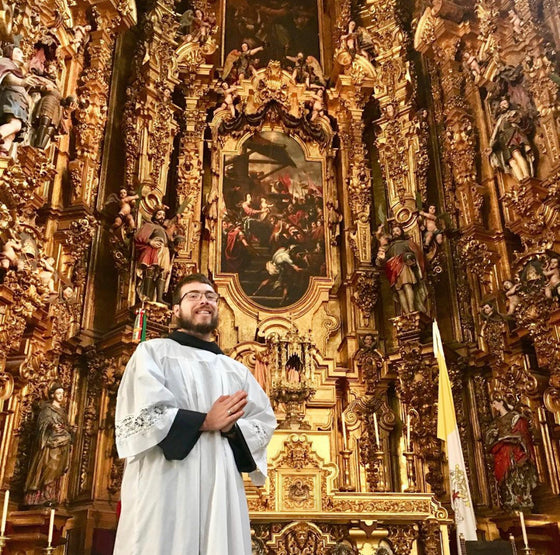July 13, 2019
An oratory should be built as conveniently as possible among the cells, where, if it can be done without difficulty, you are to gather each morning to hear Mass. ~ The Carmelite Rule #14
Above is the 14th paragraph of the Carmelite Rule. The Carmelite rule speaks much about silence, solitude and meditation upon the Law of the Lord, but this paragraph offers the other extreme of the life of Carmel. A Carmel can only exist in and with a community where the Lord is at the center. The rhythm of Carmel is a movement from the solitude of one’s cell to the communal place of prayer offered via the Eucharist. Christ is present in both the solitude of the cell and the Eucharist, but again, the Eucharist makes known a key dimension of the life in Carmel. Carmel is a place for the Incarnation.
Carmel and Carmelites are not separate from the Church. Carmelites make vows that are rooted in their baptism in the Church to manifest to the Church a vision of the reality waiting for us in the Kingdom. The Kingdom is not something we merely wait for but is a reality all Christians are called to proclaim. It is via their proclamation, composed of our words and deeds, that Christ is made known and thus the Kingdom is experienced. Again, this part of the Carmelite rule reminds the Carmelite that through their life shaped by the Eucharist barriers are removed and the incarnation of Christ is extended and made known in the world. How? Because all the baptized are part of the Church. The Church is Christ’s body. This incarnational aspect of the Church is a mystery. It is not a mystery in the sense that she is unknowable but that she is inexhaustible because of her Bridegroom.
Carmel’s devotion to the Eucharist as the primary place where the day derives is structuring, focus, and meaning gives a Carmelite the insight that in the solitude of the cell the Eucharistic presence of Christ is unfolded. That unfolding isn’t an exterior process but interior because Christ’s place in the solitude of the cell resides in the heart that carries Him into it. The dwelling in the cell offers one the means to reside with the Lord who fills, shapes, and revitalizes the physical and spiritual being of the Christian. When one realizes the all-consuming presence of Christ via the Eucharist then one begins to understand their relationship to Christ’s incarnation. The beauty of this reality is captured powerful by St. Teresa of Jesus (Avila) when she wrote:
“Christ has no body now but yours. No hands, no feet on earth but yours. Yours are the eyes through which he looks compassion on this world. Yours are the feet with which he walks to do good. Yours are the hands through which he blesses all the world. Yours are the hands, yours are the feet, yours are the eyes, you are his body. Christ has no body now on earth but yours.”
Cultivation of the heart for the presence of Christ in both the solitude of the cell and in the communal celebration of the Eucharist makes it possible to extend His presence out into the world. A world that is full of people who may have heard of Jesus but have never seen Jesus nor let alone experienced His loving presence. A Carmelite knows that Christ’s loving presence can never be confined to their cell but is meant to pour over into the world. This pouring over (Ps. 23) comes about from the Eucharist as it dwells in a heart that is a home where the windows are never closed, and the door never locked. In closing, the Carmelite rule calls for a path of straightforwardness to the Eucharist, a path that limits any difficulty of their daily journey to Christ. I pray that your time with Him may make His presence known to others without difficulty in your life.
Comments will be approved before showing up.

July 01, 2019
